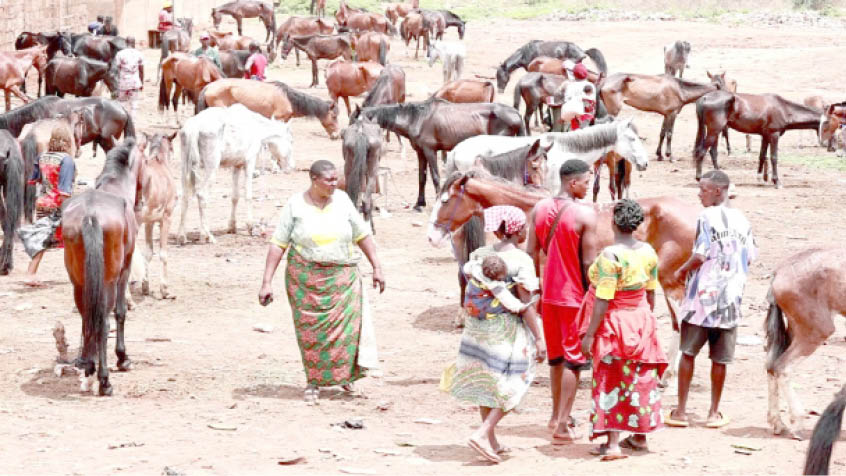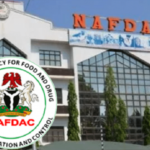Horses are found in large numbers in many areas of northern Nigeria. They are reared by the royalty, form part of the annual durbars, vital to the game of polo, and can be seen at many other events in the emirates. At a point, they suddenly began to be exported southwards. How did horses get to Obollo Afor, where horsemeat has become a popular delicacy? Daily Trust Saturday also reports that the business is thriving in the community, even among women.
A busy horse market exists in Obollo Afor, Enugu State. The community is famous for its species of yellow banana, as well as rice, cashew nuts, yams and its many traders, who you cannot miss when you visit.
- 2 dead, 5 rescued as building collapses in Abuja
- Unending tussle between IGP, PSC stalls recruitment
There is an expanse of arable land in the area, with several plains, valleys and hills. Obollo Afor is a major junction as you enter the South East. It is equally famous for horses and horse meat, which is a popular delicacy there. During occasions like burials, coronations and weddings, there is an increased demand for the meat.
Horses were taken to this part of the South East sometime in the 19th century by Nupe traders from Bida, who also spread Islam in the area. This is the background to the story of Islam in Alor Agu and Ibagwa Aka.
Hausa traders took kola-nuts to the same area and spread Islam too. Kola-nuts have become an important part of everyday life in Igbo land.
Different colours, sizes
Horses of different colours and sizes can be seen at Obollo Afor. There are stakes in the ground to which each horse is attached. From time to time, women lead horses away and young men provide fresh grass to feed them. Others lead horses out of the trailers, while some clean the trailers and keep the market tidy.
There are butchers and the middlemen, as well as drivers who made the long trip to Obollo Afor. These activities bring life to the horse economy of community.

From the North
A few meters away, at a raised portion of the market, a trailer arrives with a fresh load of horses from a market in northern Nigeria. It takes several days. The market comes alive with the arrival of the trailer.
Soon after arriving, a horse collapses as a result of long journey. A lot of talk goes on as the market gets set for the day’s trading. Long distance trade in horses between North and South has been going on for many years.
Jigawa, Geidam
Mohammed Sanusi, a trailer driver, regularly makes the long journey from the North to the South East, bearing horses. He knows all the nooks and crannies of the sometimes troubling journey.
“Every Saturday we supply four truckloads of horses from Maigatari market in Jigawa State, but when the market is not brisk, we supply three trucks. They are also being supplied from Geidam, Sokoto, Katsina and Zamfara but I can’t tell you the number of trucks. As you can see, this is the fourth truck, and the fifth is coming,” he said.
Ifeanyi Ezeme, who comes from a well-established family of horse dealers in Obollo Afor, coordinates activities within the market. Many families in the community trade in horses. Ezeme is the former chairman of the Chinedum Horse Dealers Association.
‘Horse meat, our favourite’
Ezeme told Daily Trust Saturday that horsemeat was their favourite, adding that they inherited it from their forefathers. “We like it more than any other meat. It is very tasty. Horses are brought from Jigawa, Kano, Katsina, Maiduguri and some other places. Today, we have already offloaded five trailers. And we are expecting two or three more to come. We offload two or three trailers every day. One trailer contains 45 horses.”
Man on a horse
In Thurstan Shaw’s epic work titled, Unearthing Igbo Ukwu, a bronze object depicting a man on a horse was found in one of the spots excavated in Igbo Ukwu, which is in the present day Anambra State, hundreds of kilometres from Obollo Afor. This archaeological discovery helps us to understand that horses were being imported into Igbo land as far back as the 9th Century. Indeed, the presence of the horse in the South East may have occurred much earlier than assumed.
Solomon Ugwuanyi, the secretary, Chidubem Butchers Association in Obollo Afor, said a number of female butchers were active at the market where horsemeat is sold. Some of them are widows and the horsemeat trade provides resources for them to support their households.
12 horses everyday
Ugwuanyi further said, “About 39 people, including women, engage in the business; and it is improving. Every day we slaughter 12 horses. The women use their income to train their children. Some of them are widows, so we introduced them to this business to see if they can make some profits and take care of their families.”
Huge local demand
Each day, 135 horses are brought into the Chibudem animal depot. This is equivalent to three trailer-loads of 45 horses each. During festive seasons, the number increases significantly. This is an indication of the huge local demand for horses within the Nsukka/Obollo Afor axis of Enugu State.
Ezeme also said, “In a day we offload two or three trailers. Each trailer contains 45 or 46 horses, depending on their sizes.
Impact of sit-at-home order
The sit-at-home order imposed on the South East by the Indigenous Peoples of Biafra (IPOB) has a negative impact on the horse economy of Obollo Afor, as well as other horse markets in the region. The order means that every Monday, the economy of the South East shuts down for the entire day.
“The sit-at-home order is affecting the business because on that day we will not slaughter horses and there will be no market. Every day, the butchers slaughter 20 to 25 animals, but every Monday they will not kill any horse.
“Unfortunately, I cannot do anything about it. And the union cannot do anything about it,” he said.
Lack of water
On the challenges facing the business, Ezeme said, “The challenge we have here is lack of water. Horses drink water a lot but we don’t always have it; see our tanks.”
He also said there was a steady rise in the cost of horses. “Five years ago, a horse was sold at N150,000, but now, it is N250,000.”
Ugwuanyi added, “Water is our greatest challenge in this place. We really need government to intervene in this area. This lack of water impacts on our health because we need to keep the environment clean. Every Saturday, we clean up the place to keep germs and bacteria away.”
‘I roast 10 horse heads’
Eze Chukwukama has been roasting horse heads at Obollo Afor for many years. He has mastered this offshoot of the horse trade; and he is the only person doing. According to him, the roasting requires hard work, patience and lots of stamina.
He said, “I roast horse heads. Every day, at least 20 people buy. Since I am the only one doing it, I roast at least 10 each day. It is a difficult process. I cut it, roast it and remove the bones to enable customers prepare it easily. We enjoy horsemeat; our forefathers ate it and handed over to us.”
Easter, Christmas
Ezeme further said adverse weather conditions during the rainy season in northern Nigeria affected the horse business.
“The rainy season affects us because in many parts of the North, rivers will block the roads, and this will make the horses to be scarce. The rainy season is not the best for the business. Festival periods like Easter and Christmas are the best for this business.
“Traditional rulers use the horse for coronation. They also use it on big occasions like rallies, religious events, funerals etc. In the neighbouring village of Enugu Ezike, you cannot bury somebody without a horse.
“They are the major customers we have because the horse is very important for burials,” he revealed.
On how lucrative the business is, Ugwuanyi said, “We make a lot of money here. Every day, we make approximately N3million. As an organisation we reinvest our interest in the business and other profitable ventures.”
The horsemeat market is always very busy as countless women sit by tables with meats already cut into various sizes. Buyers are always around the area trying to get good purchases. At a corner of the market, horse bones are piled up, which would be bought by a company and turned into animal feed.
Population of horses
If local demand for horses in Obollo Afor alone is as much as 135 each day, then more is needed for the rest of Nigeria. With the gestation period for a horse being 11 months, Nigeria’s horse population cannot readily replace the number lost to local demand.
Curiously, the trade in horses between North and South, significant as it is for building cohesion between groups and adding to the culinary richness of the region, may be depleting the population of animals in the country.

 Join Daily Trust WhatsApp Community For Quick Access To News and Happenings Around You.
Join Daily Trust WhatsApp Community For Quick Access To News and Happenings Around You.



